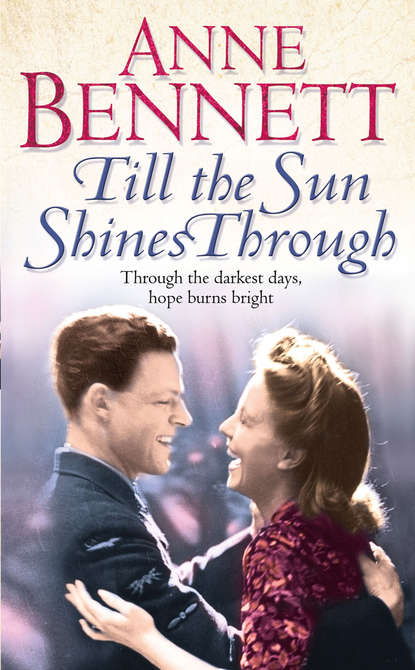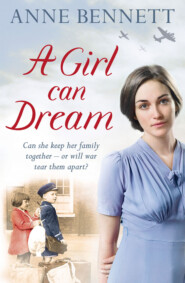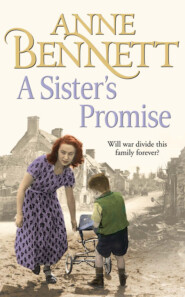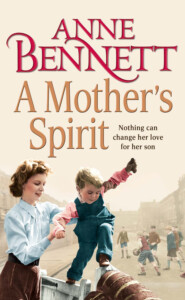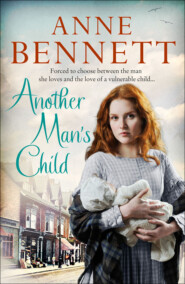По всем вопросам обращайтесь на: info@litportal.ru
(©) 2003-2024.
✖
Till the Sun Shines Through
Настройки чтения
Размер шрифта
Высота строк
Поля
Mary said the men have been that way since they were demobbed from the army. There is no work for them and many of the families are starving. I know she’s right, for you only have to see the children, with pinched-in faces like old people’s and so thin they’re just skin and bone. They have arms like sticks and quite a few have running sores on their body. Most of them are clothed in rags and many are barefoot. Aunt Ellen said even in the dead of winter it’s just the same.
Bridie was no stranger to running barefoot. In her mind, to cast off her shoes and run across the springy turf and leap the streams was linked to the freedom of summer – few children back home wore shoes then. However, in September, before she returned to school, along with the schoolbooks and jotters her parents bought her, there would be a pair of shoes. They mightn’t be new, but they would be freshly soled and heeled, and there would be stockings too to keep her from freezing altogether.
She looked at the children around the streets and hanging around the Bull Ring when she went there with Mary and wondered if many of them had ever had shoes. She doubted that when the winter chill came they’d have thicker clothes to wear either, or a good, warm coat and hats, gloves and scarves to keep the life in them.
It’s awful, Mammy, is surely is to see so many people living like this, she wrote.
There had been poverty at home in Ireland, of course there had, and people with large families they could barely feed used to get food vouchers from the St Vincent de Paul fund. The nuns there would find clothes for the children to wear, but here it was the sheer numbers of poor that overwhelmed her.
It bothered Sarah too when she read Bridie’s letter. ‘Fancy not having shoes for the winter,’ she remarked. ‘Although I shouldn’t think it’s pleasant running barefoot through city streets at any time.’
‘It’s the men out of work that I feel sorry for,’ Jimmy said. ‘God, what that would do to a man, not being able to provide for his family. Seems to me Ireland wasn’t the only one betrayed by that damned war. “Land fit for heroes” and they can’t earn a bite to put in their families’ mouths.’
‘Aye,’ Sarah agreed with a sigh. ‘It must be dreadful and Bridie doesn’t seem to be enjoying it at all.’
‘Ah well, she’ll soon be home again,’ Jimmy said, ‘and then life will go back to normal. No danger of Bridie taking a liking to the place and wanting to live there anyway.’ And that made Jimmy a happy man – it would make his world complete if, when Bridie did decide to marry, it was to one of the local boys and she’d live not far from them.
‘Aye,’ Sarah said with feeling, for she’d missed her youngest daughter and longed to have her home again. When she’d been placed in Sarah’s arms after her birth, Sarah thought she’d never rear her. She thought she’d go the way of the three she lost to TB after Johnnie. Then when Robert and Nuala had both died, she was convinced that Bridie would never reach adulthood. But here she was, on the threshold of it, and still fit and healthy, as beautiful and kindly as ever. ‘Aye, she’ll be home soon enough,’ Sarah said with satisfaction. ‘And, if you ask me, I think it will be a long time before she goes so far again.’ She could have added, ‘Unlike Mary.’ She’d been so upset when Mary went on her wee holiday in the spring of 1926 and had fallen in love with a man called Eddie Coghlan. It had only helped slightly that Eddie was from Derry and a good Catholic into the bargain, because it still meant their daughter would be living and bringing up any grandchildren miles away from them.
Sarah had been inclined to blame her sister and wrote her a letter telling her so but, as Jimmy said, love is not a thing you can watch out for. Ellen couldn’t have known that Mary would lose her heart to a man at the Easter dance they’d taken her to at their local Parish Church. At least, he’d said in Eddie’s defence, he was in work, not everyone was as fortunate.
So Eddie was welcomed into the family and Sarah never admitted how much she missed her eldest daughter. As long as she had Bridie, she told herself, she would be content, so Sarah was glad Bridie was disliking the place so much.
But, little by little, Bridie got used to the noise and bustle of the city and started to enjoy her stay at Mary’s. Eddie went out of his way to make her welcome, but she most enjoyed the times she had alone with Mary. One day, when they were alone in the house, she asked her a question that had been playing on her mind since she arrived, for Mary looked far rounder than she remembered her. ‘Mary, are you having a baby?’
‘Aye. Didn’t Mammy tell you?’
‘No. Why didn’t you? You never said in your letters.’
‘It’s silly to say the same thing twice,’ Mary said. ‘I write to you about different things, but I did think Mammy would say. I’m five months now. What did you think, that I’d just put on weight?’ Without waiting for Bridie’s reply, she asked, ‘Would you like to feel it kick?’
Bridie flushed and looked at her as if she couldn’t believe her ears. ‘Don’t you mind?’
‘Not at all.’
Bridie put her hand out and felt the child move beneath her fingers and saw the material of the smock Mary had on ripple. She was awed by the thought of a living being inside her sister. And then, because it was her sister and she felt comfortable enough, she asked the question she’d puzzled over for an age: ‘Mary, how did it get in there?’
Mary was surprised Bridie hadn’t tumbled to it living on a farm. But then she remembered Bridie was always sent elsewhere when the bull or rams were due to service their cows and sheep. It was an effort to protect her, Mary supposed, but children could be protected too much.
She bit on her lip as she considered whether to divulge the whole matter of sex with her younger sister. She’d never get the information from their mother, she knew that, because she’d never discuss anything so intimate. Mary had got all her information from Aunt Ellen and she often thanked God she had.
So she told Bridie how the seed inside her had grown into a baby and watched Bridie’s eyes open wider and wider in shock as she spoke. ‘Something else occurs before a woman can have a baby,’ Mary told her. ‘They’re called periods and they mean you bleed from your private parts every month. You need to know: I began mine at school and because I hadn’t been warned, I thought I was dying. Sister Ambrose eventually found me in the toilets, limp from crying, and explained it to me and took me home.’
‘Was Mammy cross?’
‘No,’ Mary said. ‘But she was embarrassed. She told me she had linen pads in the press ready and I was to pin one to my liberty bodice. When they were soiled I was to put them in the bucket she’d leave ready and that respectable women didn’t need to know any more than that, in fact they didn’t need to talk of it at all.’
‘And that bleeding happens to every woman every month?’ Bridie asked, curling her mouth in distaste.
‘Aye,’ Mary said, smiling at her sister’s discomfort. ‘I’m afraid it does. It’s a sort of preparation for motherhood and even people like Aunt Ellen, who’ve never had children, have periods.’
‘So, when … How will I know when it will be?’ Bridie asked.
‘Your body will change first,’ Mary told her. ‘Your breasts will begin to grow and you’ll get hair down below.’
Bridie let out a sigh of relief. She’d been horrified to see the little swellings around her nipples and even more so to see hair sprouting where it had never done before, certain that she was abnormal and too worried to even contemplate discussing it with Rosalyn.
Mary heard the sigh and saw the relief, but hid her smile. She was glad she’d told her. ‘But,’ she cautioned her, ‘don’t you be telling Mammy about this, d’you hear? She’ll have my mouth washed out with carbolic.’
‘I won’t,’ Bridie promised with a giggle, visualising her mother forcing a bar of soap into Mary’s mouth. ‘I’m glad you’ve told me. I’ve wondered, you know.’
‘Of course you’ve wondered, it’s natural,’ Mary said. ‘And you needed to be told. But one thing I do agree with Mammy about is respecting yourself. It’s all the advice she ever gave me, but for all that she was right. Boys will try to … well, you know what I mean, and if you let them, they’ll not respect you anymore. Wait for the ring like I did. Believe me, it’s worth it.’
‘I don’t know if I want to get married,’ Bridie said doubtfully. ‘I don’t think I want to be doing that sort of thing to make babies either.’
‘Oh you will, little sister,’ Mary said with a laugh. ‘You will.’
CHAPTER TWO (#ulink_2d4b9976-ac3d-5215-ab04-1aee6586f92c)
Almost as soon as Terry picked Bridie up at the docks three weeks later, she knew there was something wrong with him. But she also knew to press him would only annoy and so she waited for him to tell her.
She hadn’t long to wait: Terry was bursting to tell somebody his news and as soon as they were seated on the train, he couldn’t contain himself. Bridie looked at him in astonishment. ‘Leave the farm? But, Terry …’
‘Hear me out first,’ Terry said, ‘and then judge if you want to, Bridie.’
Bridie nodded and Terry went on. ‘Look at me – I’m twenty years old in a week’s time, I never go out, I’ve never dated a girl in all my life and why? Because I never get a penny piece of my own, that’s why. Oh, they point out, Mam and Dad, that this place will be mine one day – Seamus will hardly want it – and they remind me I have a warm house and plenty of food and clothes bought for me when I need them. Aye, I do, working clothes and a suit for Mass that I never even get to choose the colour and style of.
‘I can’t stand it, I tell you, Bridie. I don’t like farming anyway, never have, and I won’t grub around in this place for much longer, with Mammy doling out small amounts of money to me for the collection at Mass as if I was a wean.’
Bridie saw some of the injustices of Terry’s predicament that she’d never realised before. ‘Oh, Terry,’ she said. ‘Couldn’t you tell Mammy and Daddy how you feel?’
‘Do you think I haven’t tried?’ Terry snapped. ‘It’s like talking to a brick wall.’
‘But where will you go?’
‘New York,’ Terry said. ‘Seamus and Johnnie said they’d send me the fare.’
‘But what about a job?’ Bridie said, for she knew as well as any that unemployment was rife everywhere since the Great War and getting worse. ‘It’s as bad there as here. Worse, in fact. They have soup kitchens in America, Terry.’
‘I know,’ Terry said. ‘That’s the threat Mam and Dad use when I’ve mentioned it to them. Not that I’ve said that much, you know. I’ve just tested the ground as it were. I wrote to Johnnie and he said he can probably get me set on alongside him in time. There’s nothing for now, but he’s keeping an eye out and will send for me. I’m willing to work. I’ll not go to America and live off him and Seamus, never fear. All I’m waiting for is word and the money for the fare.’
Bridie knew then that eventually Terry would go. It might be weeks or even months, but he wouldn’t stay.
However, the weeks rolled by and soon winter was upon them again and still no word came from America. Still and all, Bridie told herself, there might not be a place in America for Terry for a long while. She couldn’t imagine Johnnie and Seamus to be the only Irish boys with relations clamouring to join them. The dole queues in America were as long as those anywhere else and why would they take another person into the country when it made more sense to employ one of their own?
That winter proved to be a severe one and both Jimmy and Francis were worried about their pregnant ewes. Rosalyn came over one day and complained how bad-tempered her father had become lately. Bridie expressed surprise – Francis usually had a smile on his face and had a far more relaxed attitude to life than his brother Jimmy.
They were, as usual, in the barn and Rosalyn peered out of the barn window as she said, ‘Poor things to be born in this anyway.’ She rubbed at the window with a mittened hand, clearing the ice. ‘I mean just look at it,’ she said. The landscape before them was covered in snow blown into drifts at the sides of the fields and gilding the trees and hedges.





